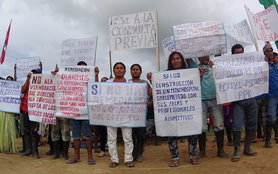For years, Oxfam has participated in a global initiative which aims to promote accountability around the management of oil, gas, and mineral resources. The EITI Standard engages 55 countries, 68 companies, and eight organizations. But maintaining the standard requires transparency, honesty, and integrity—and recent signs indicate that ExxonMobil is not playing by the rules.
“If Exxon’s lobbyist doesn’t support transparency, he must be kicked out of EITI… If the Board doesn’t hold Exxon and its representative to account, it will make a mockery of the EITI.” —Daniel Mule, Oxfam
In October, Oxfam will face a tough decision: continue to participate in the Extractive Industries Transparency Initiative (EITI), a global organization that promotes the principle that “a country’s natural resources belong to its citizens”? Or take a step back, if the Initiative proves to have fallen prey to corporate capture?
The oil giant is under fire for a decade-long effort to weaken Dodd-Frank 1504, a transparency rule for the oil, gas, and mining industries. Where ExxonMobil has successfully undermined US transparency legislation for years, the EITI now has the opportunity to tell American companies they can’t play by different rules.
This comes at the same time as shocking tapes reveal former and current ExxonMobil lobbyists detailing the company’s efforts to impede climate action and undermine climate science.
Shocking—but perhaps not surprising. While the company posts regular public statements on issues such as a carbon tax, the lobbyists admit in the tapes that they are merely “talking points” to burnish the company’s reputation.
In the tapes, these lobbyists revealed that ExxonMobil often sends industry associations (such as the American Petroleum Institute (API) and Chamber of Commerce) to lobby on its behalf as its “whipping boy”—a tactic they have long employed to undermine the progress of transparency legislation in the sector.
ExxonMobil has worked to undermine transparency rules for over a decade
Originally passed in 2010, the 1504 rule requires companies listed on the US Stock Exchange to disclose payments made to foreign governments in exchange for oil, gas, and minerals.
These disclosures help citizens hold their governments accountable for the use of natural resource revenues, so that the funds are used for their country’s development, rather than siphoned off to corruption or lost to poor governance.
When the US initially passed the 1504 rule, it led the world in “payments-to-governments” transparency—inspiring the European Union, the United Kingdom, Canada, and Norway to pass similar laws. Unfortunately—largely due to the lobbying efforts of API and ExxonMobil—the US rule has been weakened after a long legal battle, and has yet to be implemented.
The EITI also requires strong payments-to-governments disclosures—and here again ExxonMobil is avoiding responsibility.
Civil society attempts to hold ExxonMobil accountable through the EITI
ExxonMobil’s lobbyist, Matthew Gobush, represents the company on the board of the EITI, and is responsible for championing a strong payments-to-governments transparency rule in line with the global EITI Standard. However, his participation in lobbying meetings with the API shows that, while the company is gaining the reputational benefit of being part of a global transparency organization, it is working behind the scenes to undermine the core values of the initiative.
Upon discovering Gobush’s lobbying activities, Publish What You Pay-US (PWYP-US, the US branch of a worldwide initiative aimed at transparency in the extractive industries), filed a formal complaint with the EITI Board, calling for Gobush’s removal. On June 30, the EITI held an extraordinary board meeting to consider the complaint, and to determine whether to terminate Gobush’s board membership.
Unfortunately, in a statement made by EITI Chair Helen Clark, the organization dismissed the complaint, and allowed Gobush to retain his board membership. The statement revealed that approximately thirty percent of EITI member companies are currently failing to report their payments-to-governments in line with the EITI Standard. Chair Clark noted that at its upcoming October Board meeting, EITI will consider sanctions for companies that are not compliant with the rules.
In response to the EITI’s failure to hold companies responsible for their actions, PWYP-US has suspended its participation in EITI, and has encouraged other civil society organizations to follow suit.
Oxfam believes that accountability for EITI corporate members is essential to the continued integrity of the EITI Standard. We hope that the EITI Board will seize this opportunity at the October meeting to implement clear and practicable sanctioning methods for companies that are not compliant with company expectations. We will be closely monitoring its progress and will determine our continued participation in the EITI following the meeting.
We believe that transparency in the extractive industries is crucial to citizens’ abilities to hold companies and their governments accountable for the responsible use of their natural resources; we have long supported the EITI as an integral organization and framework in building that transparency.
Unfortunately, EITI’s inability to adequately respond to the PWYP-US complaint, and to hold members to account, leaves us concerned that the organization has been captured by corporate interests and is no longer operating in line with the values it is meant to uphold.



